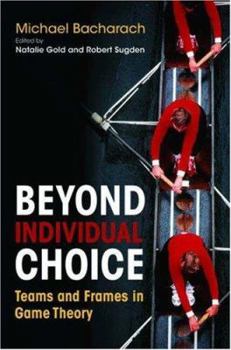Beyond Individual Choice: Teams and Frames in Game Theory
Select Format
Select Condition 
Book Overview
Game theory is central to modern understandings of how people deal with problems of coordination and cooperation. Yet, ironically, it cannot give a straightforward explanation of some of the simplest forms of human coordination and cooperation--most famously, that people can use the apparently arbitrary features of "focal points" to solve coordination problems, and that people sometimes cooperate in "prisoner's dilemmas." Addressing a wide readership...
Format:Hardcover
Language:English
ISBN:0691120056
ISBN13:9780691120058
Release Date:May 2006
Publisher:Princeton University Press
Length:248 Pages
Weight:1.08 lbs.
Dimensions:0.8" x 6.5" x 9.5"
Customer Reviews
0 rating





